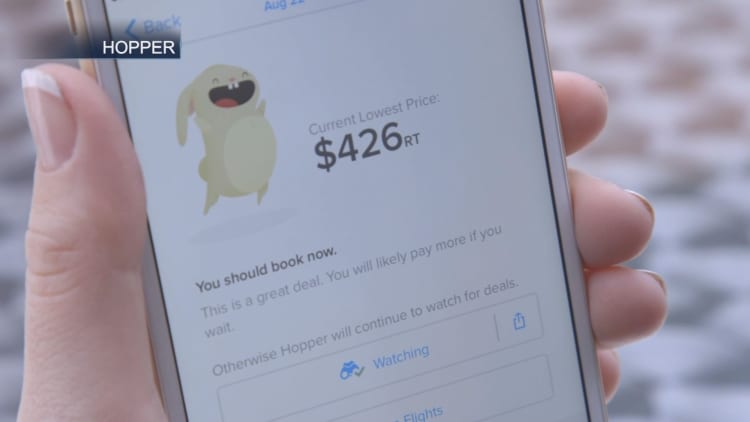
A brutal cold snap that began last week — holding much of the East Coast and Midwest in its grip — has made a warm weather getaway more urgent for some travelers.
Money may not be an object for some flyers, but for others, saving money on airfares is a priority. So how can consumers know if they're getting a good deal from the airlines?
The travel app Hopper gives users airline price guidance before they buy, and suggests whether they should wait for a better price. Hopper does not have a website, and its mobile application doesn't sell business or first class tickets.
"We're collecting a huge amount of data, something like 10 billion priced itineraries every single day. And we're looking at that over the last several years to tell you whether we think that price is going to go up," Patrick Surry, Hopper's chief data scientist, told CNBC's "On The Money" in an interview.
Based on all that data crunching, Hopper can suggest how far in advance of travel a vacationer can generally get the best deal.
"It depends a little bit on where you're going: If you're flying domestically it's typically 3 to 4 weeks." Surry said. However, international flights have longer lead times, so Surry suggested buying tickets abroad two to three months ahead of travel.
Some have speculated there is a specific hour where you'll have the greatest chance for the smallest fare, but Surry downplayed the idea.
"Everybody has story about buying on a Tuesday, and I think maybe in the old days that used to be the case," he laughed. "These days, you're fighting an army of computers. "
Still, there is still something to the idea. "Statistically speaking there's a very small advantage if you shop in the hour after midnight on Tuesday."
Surry explained the reason behind it is "probably because that's when airlines are kicking off these flash sales, and that's one of the few things that still gets done by people." He reasoned those airline flash sales are done by workers who come in on Monday.
'Skewed to younger users'
Around 70 percent of Hopper's clients are under 35, making the app "skewed obviously toward younger users," according to Surry. Those travelers are generally considered "value conscious [and] they plan farther in advance, and tend to be more leisure travelers."
From the app, travelers enter the dates and destination they're planning to visit.
"You tell us the trip you want to take and put your phone in your pocket and go play with your kids," Surry said. "We'll send you a notification and say, 'Hey, now is the time to buy.'"
Two notable exceptions to the price data the platform aggregates are Southwest Airlines and Delta, which do not share price or flight information with Hopper.
"Southwest is definitely an exclusion," Surry said. "There are some airlines that don't distribute their fares widely but we sell more than 250 airlines worldwide." So how exactly does Hopper make money?
"We're a travel agency so if you book your ticket through hopper we'll make a small commission from the airline, like any travel agency," he said. It also adds up to considerable savings for those who use the app.
Hopper users "tend to save 10 to 15 percent on your ticket," he added.
On the Money airs on CNBC Saturday at 5:30 am ET, or check listings for air times in local markets.



